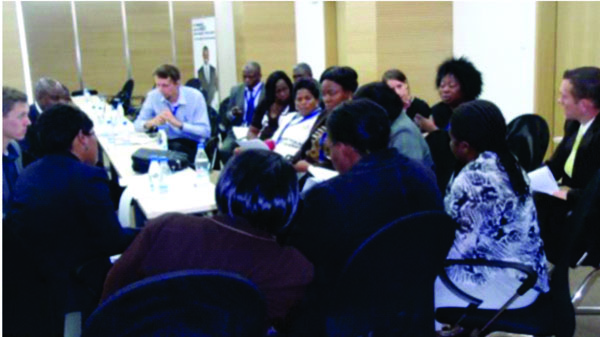
By Chris Price
The Government of Zambia, with support from the UN Joint Programme on Human Trafficking (ILO, IOM and UNICEF) and Plan International, hosted Zambia's Third National Symposium on Human Trafficking from 29th to 30th August 2012.
The Symposium, entitled “Reaching the Goal: Committing to a Zambia Free of Human Trafficking” ,brought together governmental and non-governmental actors from across the country to showcase stakeholder efforts towards combating human trafficking in Zambia; share national priorities for counter trafficking; and enhance partnership for the effective implementation of national priorities.
Additionally, the Symposium reviewed progress made in the implementation the Anti-Human Trafficking Act No. 11 of 2008 and the National Policy to Combat Trafficking in Persons.
In his speech during the Symposium Opening Ceremony, US Ambassador to Zambia, His Excellency Mr Mark Storella, said that human trafficking robbed its victims of their most fundamental human rights.
During her opening address, the United Nations Resident Coordinator to Zambia, Her Excellency Kanni Wignaraja, stated that each year, an estimated 27 million men, women and children are victim to human trafficking worldwide.
Mrs Wignaraja commended the Government, in particular the Ministry of Home Affairs, for organizing the Symposium. She highlighted that improving response capacities and understanding among law enforcement agencies and service providers on distinguishing between human trafficking and smuggling in persons is of great importance. Similarly, community awareness and vigilance and knowing the appropriate reporting channels are critical to the response.
Mrs Wignaraja stated that addressing human trafficking requires strong collaboration between government, civil society and cooperating partners and that she is proud that the UN in Zambia, in the spirit of “Delivering as One”, is working jointly to the reach the goal of eradicating human trafficking in the country.
In his address, the Deputy Minister of Home Affairs, Honourable Stephen Kampyongo, said that the issue of human trafficking is a complex crime which the government cannot combat alone. He added that there had been an increase in reported cases of human trafficking in Zambia largely as a result of awareness raising efforts, but that although progress has been made, it is important that Zambia sets priorities for continued efforts in combatting the crime.
Established in 2008, the UN Joint Programme on Human Trafficking provides support to government and civil society organizations in the national response to human trafficking with financial support from the European Union and the United States Department of State Office to Monitor and Combat Trafficking in Persons (through IOM’s JTIP project).
Zambia ratified the UN “Palermo” Protocol to Prevent, Suppress and Punish Trafficking in Persons, especially Women and Children in 2005 and following which in 2008 it enacted the Anti- Human Trafficking Act, No. 11 of 2008.